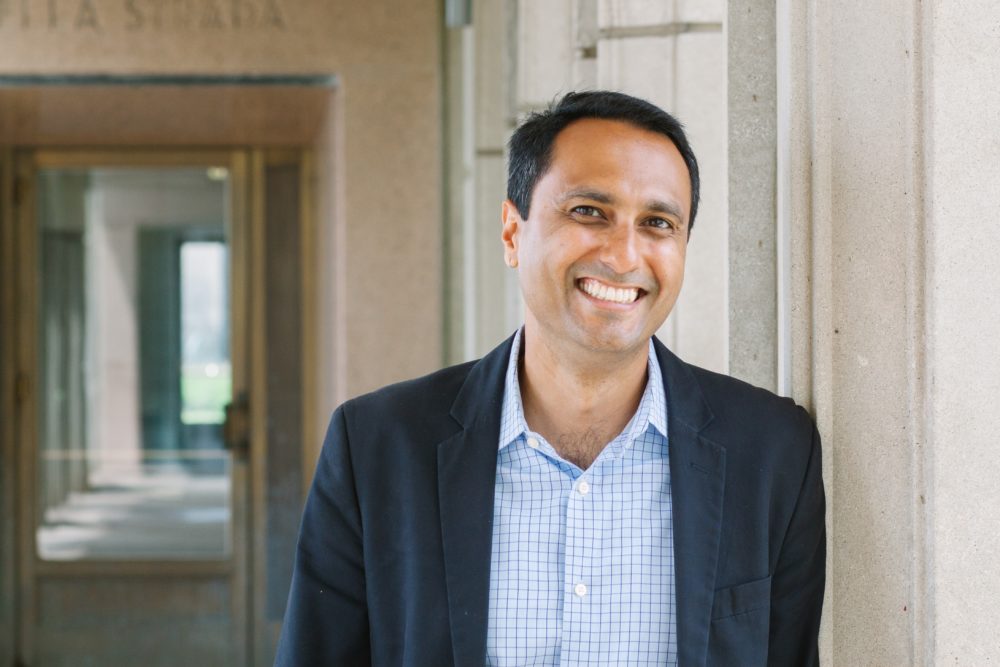
MISSION AND MINISTRY | This year’s Common Book addresses concerns common to the Loyola Marymount University community: professions of faith, interfaith cooperation, recognizing our own implicit biases, understanding that goes beyond tolerance, and finding our place in America.
“Sacred Ground: Pluralism, Prejudice and the Promise of America,” by Eboo Patel, the 2018-19 Common Book, draws on all these themes as he presents a history of religious bigotry in American politics, a sociology of nonprofits in the United States, and a “science of interfaith cooperation” and “religious diversity.” His main goal is an understanding of the country we live in. “The main character is the one I love the most — America,” Patel writes.
Author, educator, and interfaith leader Patel will speak to the LMU community on Feb. 18, 2019, at 3 p.m. in the Life Sciences Building. Patel, founder of the Interfaith Youth Core, has worked with governments, nonprofit organizations, and colleges and universities to help realize a future where religion is a bridge of cooperation rather than a divisive barrier. He is a regular contributor to the public discourse around religion in America and a frequent speaker on religious pluralism. He holds a doctorate in the sociology of religion from Oxford University, where he studied on a Rhodes scholarship.
“The Common Book program at LMU offers our community an intellectual space for engaging with topics that are at the heart of our campus,” said John Jackson, head of outreach and communications for the William H. Hannon Library and co-chair of the Common Book Committee. “It is a touchstone for assaying the relative merits of ideas against the mission of our university. We hope that this year’s book can be a unifying and engaging force that will inspire deeper conversations about interfaith and plurality.”
Patel is a passionate advocate for greater interfaith cooperation. His interfaith work has inspired him to envision a more inclusive and welcoming America where all its peoples, so rich in diversity, may truly thrive. While our nation is certainly “among the most religiously diverse countries in human history and by far the most religiously devout nations in the West,” Patel urges us to reflect more deeply upon how we are doing as a nation “when it comes to bridging our religiously diverse social capital.”
The Common Book program is an interdisciplinary initiative co-led by the Hannon Library and the Academic Resource Center. While the program focuses on first-year students as an intellectual community builder, it’s open to the entire campus community; faculty and staff members are welcome to join the conversations. Each year’s Common Book is selected by a committee of about 25 LMU faculty and staff members, and students. The committee selects an area of focus or a partner – in 2017-18 the partner was the Academy of Catholic Thought and Imagination and the year before the partner was the Bellarmine Forum – and then a book is selected. More information is available here: https://academics.lmu.edu/commonbook/.
This year’s Common Book discussion is co-sponsored by First Amendment Week, an initiative of the Los Angeles Loyolan, the award-winning LMU campus newspaper. During Patel’s visit to campus, he will meet with university leadership, have lunch with Common Book committee members, and then meet with student leaders after his speech.
“This year’s selection process exemplified diplomacy and consensus building.” said Mia Watson, director of the Academic Resource Center and co-chair of the Common Book Committee. “After approving our three finalists, the committee read each book and came together to discuss which book best complimented the efforts and mission of LMU. At the close of the discussion, ‘Sacred Ground’ was the unanimous choice.”
“Sacred Ground” was selected based on a number of considerations, including current conversations that have been happening on campus about dialogue and difficult/polarizing conversations. One committee member believed that this book would integrate well with the intercultural awareness and implicit-bias training being offered to first-year students as part of orientation.
Patel quotes “Democracy in America,” Alexis de Tocqueville’s 1835 book: “The greatness of America lies not in being more enlightened than any other nation, but rather in her ability to repair her faults.” And Patel adds his own coda: “Every generation has to affirm and extend the American promise.”



